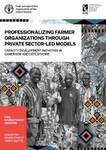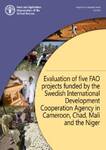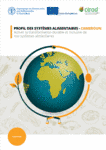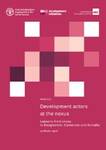Vidéos
Publications & Documentation
Programme de formation professionnelle des secteurs agropastoral et halieutique du Cameroun
Cette publication fait partie de la collection Country Investment Highlights du programme Knowledge for Investment (K4I) du Centre d'investissement de la FAO.
Capacity development initiatives in Cameroon and Côte d’Ivoire
This publication is part of the Country Investment Highlights series under the FAO Investment Centre's Knowledge for Investment (K4I) programme.
The evaluation seeks to contribute to organization-wide learning by drawing lessons from the multi-year funded resilience projects implemented in the Sahel and Cameroon and making recommendations for future programming. FAO intervened in these countries to strengthen the resilience of vulnerable households affected by the crisis in the Sahel through promoting sustainable livelihood.
Activer la transformation durable et inclusive de nos systèmes alimentaires
Ce document, intitulé Profil des systèmes alimentaires, présente en une dizaine de pages un condensé des problématiques principales des systèmes alimentaires du Cameroun, et des solutions possibles pour les rendre plus durables et inclusifs. C'est le résultat d'une analyse systémique et d'une consultation de tous les acteurs des systèmes alimentaires dans plus de 50 pays.
Emergency Assistance to Improve Food and Nutrition Security of IDPS in South West Region of Cameroon
The aim of the project was to improve the food and nutrition security of internally displaced people in Cameroon. Initially, the project sought to reach 500 families, or approximately 3 500 direct beneficiaries. Four outputs were envisioned for the project. These included: supporting broiler production (Output 1); supporting egg production (Output 2); supporting production through market gardening and nutrition education (Output 3); and strengthening the capacity of national institutions in data collection and processing, and developing early warning systems for conflict-affected areas (Output 4).
Ce Profil national genre des secteurs de l’agriculture et du développement rural analyse les inégalités entre les hommes et les femmes, les bonnes pratiques et les recommandations pour l’autonomisation des femmes dans l’agriculture, les chaines de valeurs, la sécurité alimentaire et nutritionnelle, et la gestion des ressources naturelles.
This report focuses on the role of development cooperation in addressing protracted humanitarian crises, defined as situations characterized by prolonged or recurring threats to the fundamental well-being, health and safety of the population, and where there is an ongoing humanitarian response. This initiative is a follow-up to a previous study undertaken last year by FAO and NCR on Financing the Nexus, which identified the pressing need for development actors to play more of a lead role in crisis contexts.








